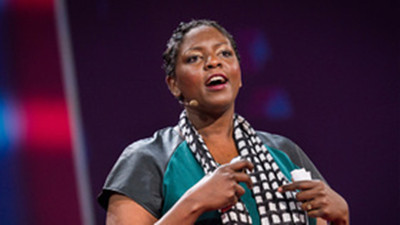Election night 2008 was a night that tore me in half.
2008年的大選之夜,我激動萬分。
It was the night that Barack Obama was elected.
這一夜,巴拉克奧巴馬當選總統。
years after the end of slavery,years after the passage of the Voting Rights Act,an African-American was elected president.
奴隸制廢除后148年,也是選舉權法通過后48年,一位非裔美國人當選總統。
Many of us never thought that this was possible until the moment that it happened.
我們中有許多人從未想過這一天會到來,直到此刻出現。
And in many ways, it was the climax of the black civil rights movement in the United States.
在諸多層面上,這是美國黑人民權運動的巔峰。
I was in California that night,which was ground zero at the time for another movement:the marriage equality movement.
那一夜,我在加州。那兒,那一刻,正發起另一場運動:婚姻平權運動。
Gay marriage was on the ballot in the form of Proposition 8,and as the election returns started to come in,it became clear that the right for same sex couples to marry,which had recently been granted by the California courts,was going to be taken away.
同性戀婚姻以8號提案的形式,被投票表決。然而正當選舉開始運作時最近被加利福尼亞州法庭,通過的同性夫婦結婚的權利,似乎,正趨于被剝奪(之邊緣)。
So on the same night that Barack Obama won his historic presidency,the lesbian and gay community suffered one of our most painful defeats.
所以,當夜,正值巴拉克奧巴馬贏得他歷史性總統席位之時,女同及男同社區卻遭受了有史以來最慘痛的失敗之一。
And then it got even worse.
然后,情勢每況愈下

Pretty much immediately,African-Americans started to be blamed for the passage of Proposition 8.
不久,非裔美國人就因8號法案被譴責
This was largely due to an incorrect poll that said that blacks had voted for the measure by something like 70 percent.
這很大程度上,緣于一份有誤的民意調查。它顯示,黑人占選舉人數的,70%左右。
This turned out not to be true,but this idea of pervasive black homophobia set in,and was grabbed on by the media.
這后來被證明不實。但是,同性戀恐懼癥的概念,卻由此四處擴散。它被媒體惡意攫取了。
I couldn't tear myself away from the coverage.
我不能將視線從這一新聞報道上轉移,
I listened to some gay commentator say that the African-American community was notoriously homophobic,and now that civil rights had been achieved for us,we wanted to take away other people's rights.
我聽到有些同性戀時事評論員說到,非裔美國人社區,是聲名狼藉的同性戀恐懼者聚積地,現在我們的民權訴求已經實現,而我們卻想剝奪他人之權利。
There were even reports of racist epithets being thrown at some of the participants of the gay rights rallies that took place after the election.
在大選后,更有甚者,報道稱,種族主義者,對同性戀權利集會參與者謾罵連篇。
And on the other side,some African-Americans dismissed or ignored homophobia that was indeed real in our community.
另一方面,有些非裔美國人也忽略了同性戀恐懼癥確然存在于我們社區。
And others resented this comparison between gay rights and civil rights,and once again, the sinking feeling that two minority groups of which I'm both a part of were competing with each other,instead of supporting each other overwhelmed and, frankly, pissed me off.
亦有人,對同性戀權利運動與民權運動的比較滿腹牢騷。又一次,那種我所屬的兩個少數團體在互相競爭而非相互支持的無力感,向我襲來。它們最終壓垮了我,坦率而言,也使得我怒發沖冠。
Now, I'm a documentary filmmaker,so after going through my pissed off stage and yelling at the television and radio,my next instinct was to make a movie.
如今,我是一位紀錄片制作人。所以,在經歷人生低谷并朝電視與收音機大喊大叫后,我出于本能的,做了部影片。
And what guided me in making this film was,how was this happening?
我的動力之源,(即為深深縈繞腦海的問題:)這怎么發生的?
How was it that the gay rights movement was being pitted against the civil rights movement?
為何,同性戀權利運動與民權運動爭鋒相對?
And this wasn't just an abstract question.
這不只是個抽象問題,
I'm a beneficiary of both movements,so this was actually personal.
因為我同為這兩個運動的受益者,所以,這實際上,是個人問題。
But then something else happened after that election in 2008.
但,在2008年大選之后,發生了一些意想不到的事。
The march towards gay equality accelerated at a pace that surprised and shocked everyone,and is still reshaping our laws and our policies,our institutions and our entire country.
向著同性戀權利平等,大步邁進的響聲,震驚了每一人,并重塑著我們的法律,政策,我們的制度,及整個國家。
And so it started to become increasingly clear to me that this pitting of the two movements against each other actually didn't make sense,and that they were in fact much, much more interconnected,and that, in fact, some of the way that the gay rights movement has been able to make such incredible gains so quickly,is that it's used some of the same tactics and strategies that were first laid down by the civil rights movement.
所以,我愈發的清晰,這兩個運動,互相扯皮,訴之無益。相反,他們的聯系實際上非常地緊密。而且,就某方面而言,同性戀權利運動(的規模)能如此飛速的增長,得益于民權運動留下的策略與方法。



